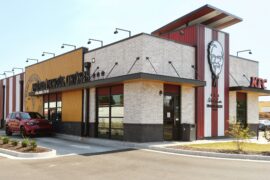The most recent drumbeat in Washington from the White House National Economic Council (NEC) blaming the meat and poultry industry for rising meat prices came in a blog post on December 10, according to the National Chicken Council (NCC). The non-profit trade association was quick to respond to what it regards as the Biden Administration’s failed economic policies, issuing a press release that quotes the US federal government’s own data.
The Consumer Price Index for All Urban Consumers (CPI-U) increased 0.8 percent in November of 2021 on a seasonally adjusted basis after rising 0.9 percent in October, the US Bureau of Labor Statistics reported on December 10. Over the last 12 months, the all items index increased 6.8 percent before seasonal adjustment.
Gasoline prices rose another 6.1% for the month – the same increase as October – bringing the annual increase to 58.1%. Fuel oil shot up 3.5%, for a 59.3% year over year surge.
Unusually high demand is a crucial factor driving higher inflation. Spending has jumped as more people received Covid-19 vaccinations, businesses reopened and people returned to work. The shortage of workers is also driving up wages, putting pressure on companies to raise prices.
So, where are Americans seeing inflation? Nearly every part of their livelihoods, according the latest CPI statistics:
•Gas +58%
•Rental cars +37%
•Propane +34%
•Used cars +31%
•Utility gas service +25%
•Hotels +22%
•Bacon +21%
•Beef +21%
•Pork +17%
•Furniture +14%
•Fresh fish/seafood +11%
•New cars +11%
•Tires +11%
•Chicken +9%
•Women’s dresses +9%
•Television sets +8%
•Eggs +8%
•Apples +7%
•Restaurant prices +6%
•Electricity +6%
“A 9 percent year over year price increase for chicken is barely outpacing inflation – and that’s despite the fact that our major inputs like corn, soybeans, gasoline, packaging and transportation are all up double and triple digits, on top of a labor shortage. Demand is outpacing supply. This is Economics 101,” said NCC President Mike Brown. “It’s time for the NEC to stop playing chicken with our food system and stop using the meat industry as a scapegoat for the significant challenges facing our economy.
“This is all on top of truck driver shortages, backlogs at our ports, shipping delays, and a government spending spree that’s causing an inflationary spiral. This administration should be looking at the chicken industry as a model of success, instead of creating a boogeyman to justify an unnecessary and expensive foray into our food supply.”
The public knows and understands that unnecessary regulations will have the opposite effect on prices – at the worst possible time, according to Brown. Most economists agree that the inflation and supply chain crises are tightly linked.
A recent I&I/TIPP Poll asked 1,306 adults conducted by TechnoMetrica Market Intelligence from October 27-29 asked: “Who or what is primarily responsible for the supply chain crisis?”
Thirty-six percent of respondents blamed “President Joe Biden and his administration” for the monumental supply chain disruption, while 27% pointed their fingers at “government regulations.” All told, 63% blamed the government as the source of the problem, versus 15% who said the “private sector” and 14% who said “the workforce.”
“It’s time to stop playing the blame game and time for government and the private sector to sit down and work together to address the root challenges affecting our economy and find solutions,” said Brown.






